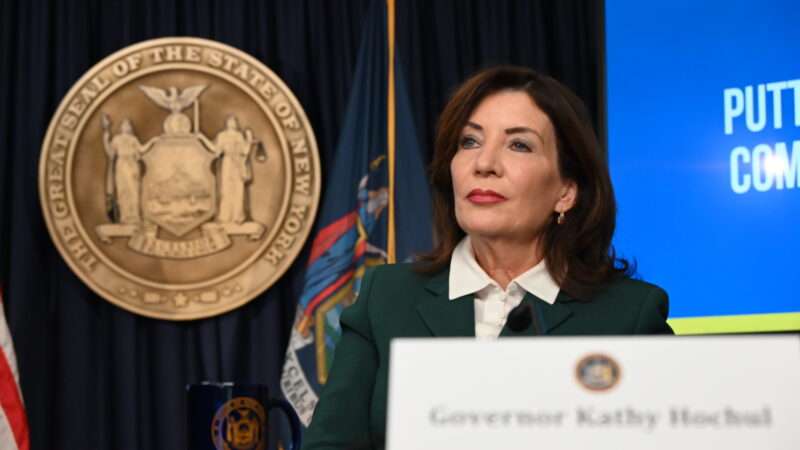Restaurant Reservation Markets Are Good. Outlawing Them Is Not.

New York Gov. Kathy Hochul (D) signed the Restaurant Reservation Anti-Piracy Act into law on December 19, 2024, prohibiting third-party restaurant reservation services from arranging reservations unauthorized by restaurants. Hochul celebrated the passage of the Act as “giving everyone a chance to get a seat at the dinner table.” But banning certain third-party reservation services from selling to consumers doesn’t create more seats at fine dining establishments, it just changes how you get one—or don’t.
New York Sen. Nathalia Fernandez (D–Bronx), the sponsor of the Act, blames unauthorized resellers like Appointment Trader for causing “chaos for restaurants with last-minute cancellations and no-shows.” Andrew Rigie, the executive director of the New York City Hospitality Alliance, echoes Fernandez’s concerns, saying that restaurant reservation scalping “creates a barrier” between restaurants and customers “when unknown guests show up.”
The frustration of restaurateurs not knowing who’s going to dine at their establishments is understandable. Unnecessary vacancies are uniformly bad for restaurateurs, staff, and diners. Seeking to remedy this, the act bans reservation services from listing reservations without a written agreement from restaurants. Reservation services found in violation of the act, which goes into effect on February 17, could face fines of $1,000 per day, per restaurant.
Melissa Fleischut, president and CEO of the New York State Restaurant Association, laments how “AI bots have exploited their hard work by hoarding these coveted reservations and selling them for a profit.” Assemblymember Alex Bores (D–Manhattan) goes further, accusing unauthorized restaurant reservation services of being a “leech industry.”
But allocating scarce goods—in this case, seats at popular restaurants—to consumers who value them most isn’t parasitic; it creates value for consumers.
The most popular restaurants often can’t accommodate everyone who wants to dine at them. Reservations coordinate scarce seats with abundant demand. If restaurant owners don’t want third parties profiting from this arbitrage, then they can charge a reservation fee themselves. Rigie tells Reason that restaurants can “charge a booking fee then apply that amount off the final bill” or take credit card information and charge only in the event of a no-show. Both strategies discourage diners from flaking, which otherwise leaves restaurants with empty seats and diminished revenues.
The introduction of paid reservations also imposes a cost on unauthorized resellers, thereby disincentivizing them from scooping up more seats than they can profitably sell to customers. If resellers still find it profitable to purchase reservations, then doing so allocates seats to those customers who desire them the most and who put their money where their mouths are.
After New York City’s outdoor dining crackdown, restaurateurs should be more circumspect about getting the government involved in the dining business. The way to solve the problem of no-shows isn’t through heavy-handed legislation and onerous fines, but by restaurants charging for reservations themselves.
The post Restaurant Reservation Markets Are Good. Outlawing Them Is Not. appeared first on Reason.com.
Source: https://reason.com/2025/01/02/restaurant-reservation-markets-are-good-outlawing-them-is-not/
Anyone can join.
Anyone can contribute.
Anyone can become informed about their world.
"United We Stand" Click Here To Create Your Personal Citizen Journalist Account Today, Be Sure To Invite Your Friends.
Before It’s News® is a community of individuals who report on what’s going on around them, from all around the world. Anyone can join. Anyone can contribute. Anyone can become informed about their world. "United We Stand" Click Here To Create Your Personal Citizen Journalist Account Today, Be Sure To Invite Your Friends.
LION'S MANE PRODUCT
Try Our Lion’s Mane WHOLE MIND Nootropic Blend 60 Capsules
Mushrooms are having a moment. One fabulous fungus in particular, lion’s mane, may help improve memory, depression and anxiety symptoms. They are also an excellent source of nutrients that show promise as a therapy for dementia, and other neurodegenerative diseases. If you’re living with anxiety or depression, you may be curious about all the therapy options out there — including the natural ones.Our Lion’s Mane WHOLE MIND Nootropic Blend has been formulated to utilize the potency of Lion’s mane but also include the benefits of four other Highly Beneficial Mushrooms. Synergistically, they work together to Build your health through improving cognitive function and immunity regardless of your age. Our Nootropic not only improves your Cognitive Function and Activates your Immune System, but it benefits growth of Essential Gut Flora, further enhancing your Vitality.
Our Formula includes: Lion’s Mane Mushrooms which Increase Brain Power through nerve growth, lessen anxiety, reduce depression, and improve concentration. Its an excellent adaptogen, promotes sleep and improves immunity. Shiitake Mushrooms which Fight cancer cells and infectious disease, boost the immune system, promotes brain function, and serves as a source of B vitamins. Maitake Mushrooms which regulate blood sugar levels of diabetics, reduce hypertension and boosts the immune system. Reishi Mushrooms which Fight inflammation, liver disease, fatigue, tumor growth and cancer. They Improve skin disorders and soothes digestive problems, stomach ulcers and leaky gut syndrome. Chaga Mushrooms which have anti-aging effects, boost immune function, improve stamina and athletic performance, even act as a natural aphrodisiac, fighting diabetes and improving liver function. Try Our Lion’s Mane WHOLE MIND Nootropic Blend 60 Capsules Today. Be 100% Satisfied or Receive a Full Money Back Guarantee. Order Yours Today by Following This Link.






